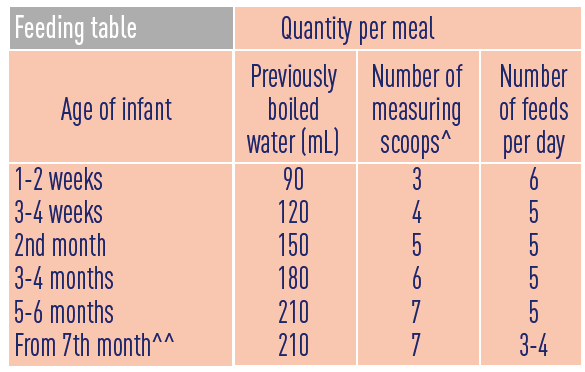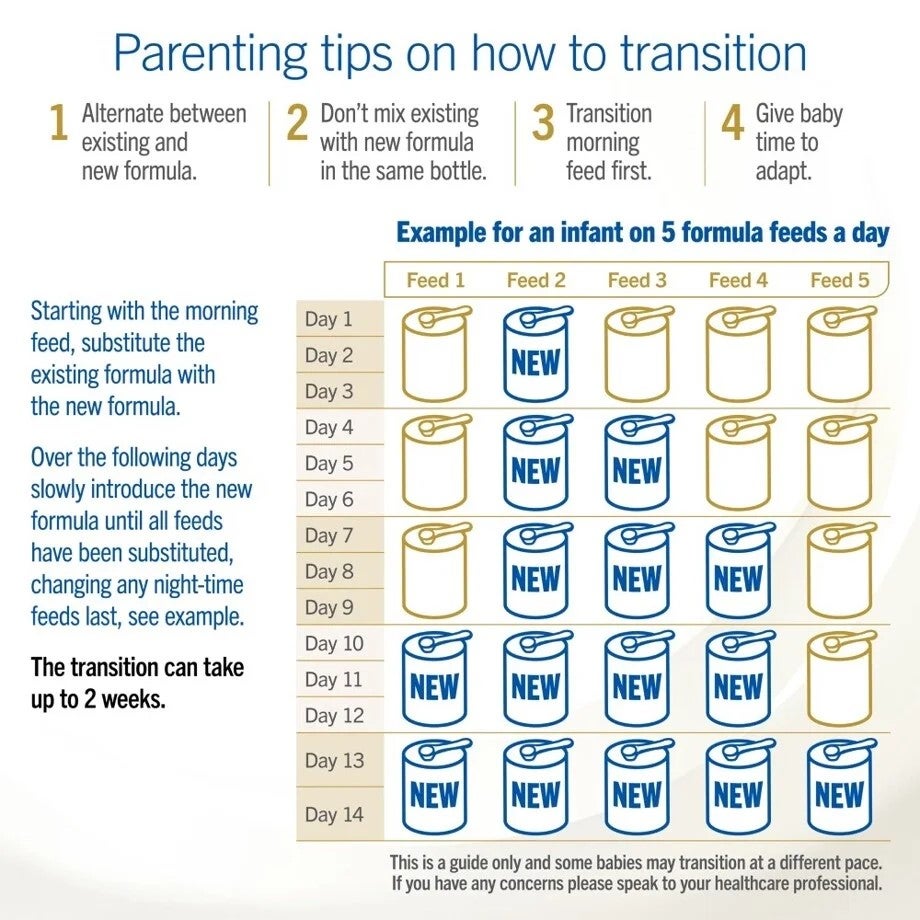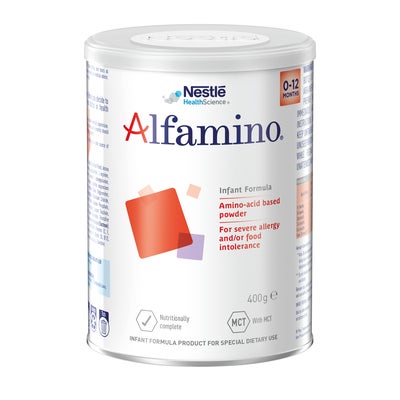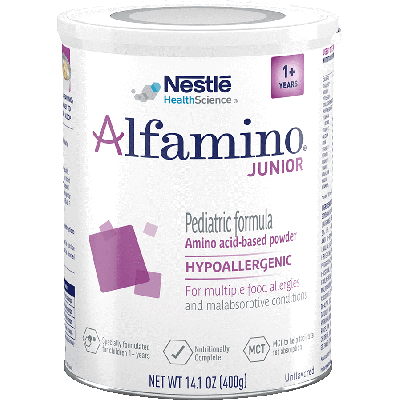Nestlé Australia is recalling select batches of ALFAMINO® infant formula as a precautionary measure. The safety and well-being of babies is our top priority.
Rest assured, the product recall does not affect any other batches or other ALFAMINO products including ALFAMINO® Junior.
An impacted batch can be identified by the batch number and use by date that appear at the bottom of the tin.
For further information including a full list of batches please see our Nestle website
Alfamino® is an amino acid based infant formula specifically formulated for infants (0-12 months) with severe cow’s milk protein allergy, eosinophilic oesophagitis, intestinal malabsorption and/or multiple food intolerances.
Alfamino® is nutritionally complete and suitable as a sole source of nutrition from birth or supplementary feeding from 6 months of age to support healthy growth and development in formula fed infants.
To purchase online - Australian Prescription holders (Authority Script) only, click below:

You will be redirected to Pharmacy Online – please read their terms and conditions as Nestlé Health Science is not liable for our partner sites. Subject to availability.
- Amino acid based infant formula for special dietary use
- Protein source is 100% free amino acids
- Contains Medium chain triglycerides (MCTs) (24% of total fat) to support fat absorption
- Contains specially designed structured lipids to help facilitate fat and calcium absorption
- Contains DHA and ARA
Energy Density: 0.66kcal/ml or 2.8kj/ml
Energy Distribution
- Protein* - 13.3g/100g (11% kcal)
- Carbohydrates – 55.3g/100g (45% kcal)
- Fat – 24.6g/100g (44% kcal)
Osmolality: 333 mOsm/kg water
Osmolarity: 299 mOsm/L
*Represents the sum of added amino acids
- Eosinophilic oesophagitis (EoE)
- Multiple food protein allergy
- Severe intestinal malabsorption
- Intolerance to extensively hydrolysed formulas
Corn Syrup Solids, Vegetable Oil (Sunflower, Canola, Esterified Palm), Amino Acids (L-lysine acetate, L-leucine, L-proline, L-glutamine, L-arginine, L-valine, L-isoleucine, Glycine, L-threonine, L-serine, L-phenylalanine, L-tyrosine, L-aspartic acid, L-histidine, L-alanine, L-cystine, magnesium L-aspartate, L-tryptophan, L-methionine), Medium Chain Triglycerides, Potato Starch, Minerals (Calcium Glycerophosphate, Potassium Chloride, Sodium Citrate, Calcium Citrate, Potassium Citrate, Sodium Phosphate, Magnesium Oxide, Ferrous Sulphate, Zinc Sulphate, Copper Sulphate, Manganese Sulphate, Potassium Iodide, Sodium Selenate), Emulsifier [472c], Oligosaccharides (2’-Fucosyllactose, Lacto-N-neotetraose) (lactose), Mortierella Alpina Oil (ARA), Schizochytrium sp. oil (DHA), Vitamins (C, E, Niacin, Pantothenic Acid, B2, A, B1, B6, Folic Acid, K1, Biotin, D3, B12), Choline Bitartrate, Acidity Regulator (330), Inositol, Taurine, L-Carnitine.
| NUTRIENT | UNITS | (1)Per 100 g* | (1)Per 100 mL* |
| Energy | kJ / kcal | 2085 / 498 | 277 / 66 |
| Protein** (11% kcal) | g | 13.3 | 1.8 |
| Fat (44% kcal) | g | 24.6 | 3.3 |
| of which: | |||
| - Polyunsaturated fat | g | 5.4 | 0.72 |
| - Monounsaturated | g | 9.1 | 1.2 |
| - DHA | mg | 80 | 10.6 |
| - ARA | mg | 80 | 10.6 |
| - α-linolenic acid | g | 0.4 | 0.06 |
| - linoleic acid | g | 4.6 | 0.61 |
| - MCT | g | 6 | 0.8 |
| Carbohydrate (45% kcal) | g | 55.3 | 7.3 |
| of which: | |||
| - sugars | g | 4.4 | 0.6 |
| Minerals | (1)Per 100 g* | (1)Per 100 mL* | |
| Calcium | mg | 540 | 72 |
| Copper | μg | 400 | 53 |
| Iodine | μg | 100 | 13 |
| Iron | mg | 5.0 | 0.7 |
| Magnesium | mg | 50 | 6.6 |
| Manganese | μg | 75 | 10 |
| Phosphorus | mg | 360 | 49 |
| Selenium | μg | 15 | 2 |
| Zinc | mg | 5.0 | 0.7 |
| Chloride | mg | 420 | 56 |
| Potassium | mg | 570 | 76 |
| Sodium | mg | 210 | 30 |
| Vitamins | (1)Per 100 g* | (1)Per 100 mL* | |
| Vitamin A | μg RE | 550 | 60 |
| Vitamin B6 | mg | 0.4 | 0.1 |
| Vitamin B12 | μg | 3.5 | 0.5 |
| Vitamin C | mg | 90 | 12 |
| Vitamin D | μg | 8 | 1.1 |
| Vitamin E | mg α-TE | 11 | 1.5 |
| Vitamin K | μg | 50 | 6.6 |
| Biotin | μg | 14 | 1.9 |
| Niacin | mg | 5.5 | 0.7 |
| Folic acid | μg | 100 | 13 |
| Pantothenic acid | mg | 3.5 | 0.47 |
| Riboflavin | mg | 1.1 | 0.15 |
| Thiamin | mg | 0.47 | 0.06 |
| Other nutrients | |||
| Taurine | mg | 43 | 5.7 |
| L-Carnitine | mg | 8.1 | 1.1 |
| Choline | mg | 52 | 7 |
| Inositol | mg | 55 | 7.3 |
| 2'-Fucosyllactose | mg | 752 | 100 |
| Lacto-N-neotetraose | mg | 376 | 50 |
Osmolarity: 299 mOsm/l
RE = Retinol-Equivalent
TE = Tocopherol-Equivalent
(1)Average Amount
* 1 litre = 139 g powder + 900 mL water.
** Represents the sum of added amino acids.
Total Nitrogen x 6.25 equals to 14.5 g protein / 100 g of powder.
- Wash hands before preparing baby’s formula.
- Wash bottle, teat and cap thoroughly until no formula remains.
- Boil for 5 min. Leave covered until use.
- Boil drinking water for 5 min, allow to cool until lukewarm (approx. 40°C).
- Consult feeding table, pour exact amount of lukewarm water into boiled bottle.
- Only use scoop from this can and level using the inner rim.
- Consult feeding table, add exact number of level scoops for the age of baby. Replace lid firmly.
- Shake bottle vigorously until powder fully dissolved. Check temperature before feeding the baby. Feed immediately.
- Close the can tightly after each use and store in a cool dry place, before and after opening.
WARNING: Only prepare one bottle at a time. Clean the area where you are going to prepare the bottle. Feed immediately and follow the instructions exactly. Do not keep unfinished bottle, discard unused portion. Always hold baby while feeding. Leaving baby unattended may cause choking.
WARNING:Follow instructions exactly. Prepare bottles and teats as directed. Do not change proportions of powder except on medical advice. Incorrect preparation can make your baby very ill.

Whenever you change from one feeding option to another it’s important to give your baby some time to adapt to the new feed.

ALFAMINO® is an infant formula product for special dietary use and must be used under medical supervision. It is not suitable for general use.
Breast milk is best for babies. Before you decide to use this product, consult your doctor or healthcare professional for advice.
More about cow’s milk protein allergy (CMPA)
BREASTFEEDING IS BEST FOR BABIES.
Of all food allergies, cow’s milk protein allergy or CMPA is the most common one in infancy.
In Australia and New Zealand more than 2% (1 in 50) of infants are allergic to cow's milk*. Most children outgrow cow's milk allergy by the age of three to five years. Although nearly half of the children affected by CMPA grow out of it by 1 year, and two-thirds at 2, we understand that in the initial stages it can be a very challenging time as a parent.
Food allergies such as CMPA can affect anyone, however those infants with a family history of allergy are at higher risk. CMPA occurs when a baby’s immune system reacts negatively to the proteins in cow’s milk.
- If formula-fed, the reaction is to the milk protein in the formula.
- If breastfed, the reaction is due to milk protein in the diet of older infants or it may be due to milk protein passed from the mother through breast milk. Continued breastfeeding is encouraged and your doctor can advise on the most appropriate feeding options, depending upon your baby's symptoms.
In both cases, the cow’s milk protein triggers the body’s immune system to have an allergic reaction. This can cause symptoms that affect the skin, breathing and/or digestive system of your baby. There are two types of allergic reactions:
- IgE mediated –rapid onset allergic reactions and can occur within 15 minutes after consuming cows’ milk or dairy products.
- Non-IgE mediated - delayed reactions to cows’ milk may take up to several hours to days to appear after consumption of the allergen.
If you are concerned that your child may have CMPA, speak with your child’s doctor to discuss symptoms and possible diagnosis. In case of a severe allergic reaction, seek medical assistance without delay. Once diagnosed, CMPA can be effectively managed in consultation with a healthcare professional. The key is to seek support from a healthcare professional as early as possible in the journey to ensure an early and correct diagnosis.
*ASCIA Cow’s Milk (Dairy) AllergyCow`s milk (dairy) allergy - Australasian Society of Clinical Immunology and Allergy (ASCIA)
ALFAMINO
Breast milk is best for baby and provides ideal nutrition. Good maternal nutrition is important for preparation and maintenance of breastfeeding. Introducing partial bottle feeding could negatively affect breastfeeding and reversing a decision not to breastfeed is difficult. Professional advice should be followed on infant feeding. Infant formula should be prepared and used exactly as directed or it could pose a health hazard. The preparation requirements and cost of providing infant formula until 12 months of age should be considered before making a decision to formula feed.
Mothers should be encouraged to continue breastfeeding even when their infants have cow’s milk protein allergy. If a decision to use an infant formula for special dietary use is taken, it must be used under medical supervision.
If you are a healthcare professional and require further information or clarification, please contact your Nestlé Health Science Account Specialist or alternatively submit the online form available here. For Consumer Services please contact us on 1800 671 628


